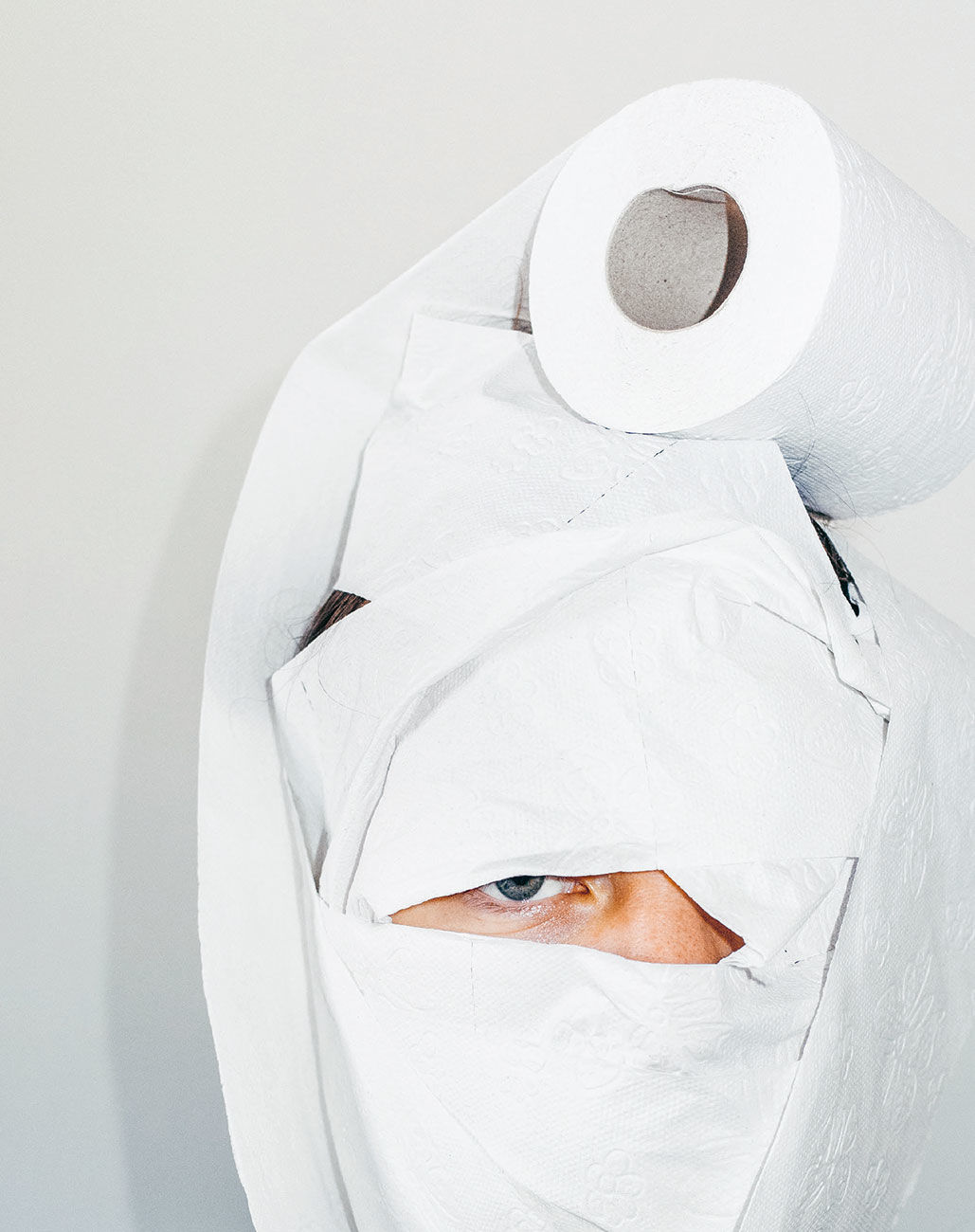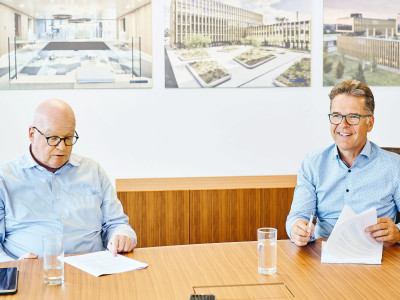
How secure is secure?
Life involves insecurity. And this may well be precisely why the pursuit of security is a fundamental human need. But what exactly does security mean? There's only one thing that we can safely say: this word means a lot. What follows is an attempt to discuss and clarify the concept of security.
How secure do you feel – today, and in general? Security: exactly what do you think it means? The word crops up so often in our usage of language that its meaning has almost become inflated. Nevertheless, security is a highly emotional and personal concept – and each individual focuses on a different aspect of it. One point is beyond doubt: security is a fundamental need.
But what do we actually require in order to feel secure? The notion of security can refer to every conceivable aspect of life – personal and financial security, data and information security, protection against burglary or intrusion, safety at the workplace – and even protection against pandemics and natural disasters. In daily life, we are constantly confronted with the issue of security – either consciously or unconsciously: safety regulations, insurance policies, safety belts, firewalls, protective clothing and all the rest of it: these things make our lives safer and more secure. But how do we actually understand security?
Everything's a matter of perspective
For most people, security means assured basic health and social care, a roof over their head, permanent employment, economic security, a secure political situation and the freedom to walk the streets at any time without fear. For some others, security means being healthy and having a secure social network with stable friendships and good family cohesion. Everyday routine, structure and reliability can also provide security: being able to rely on some things staying just as they are.
Security is defined as the state of being physically and mentally protected against danger or harm. The actual absence of danger – security or safety in the objective sense – can be measured. For example, we can gauge how safe Switzerland is by looking at the annual crime statistics from the police. According to this source, around 36,400 cases of burglary and theft by stealth were registered throughout Switzerland in 2019. That figure is 6.3 percent down year-on-year – and it is only half of the figure for 2012, the record year. But does it really feel as if your own goods and chattels are safer than they were a few years ago? In point of fact, the number of crimes involving fraud has soared by a massive 125 percent since 2009. Police crime statistics suggest that this is because digital crime is becoming more widespread. Is this causing people to make less use of the internet than in the past? Is it prompting people to stop using WhatsApp to chat with their families?
"How much freedom are we prepared to sacrifice for the sake of security?"
The relevance of subjective security
In this context, security emerges as a construct of social perception: insecurity has to be felt in order to exist. Tourists in a part of a town they regard as dangerous from hearsay may feel insecure, even though there are no actual sources of danger. The subjective sense of security is central to people feeling comfortable and safe in their environment – irrespective of whether or not the security that they perceive actually exists. A sense of insecurity is triggered by many different factors that – above all – are individual. An individual's socio-demographic characteristics, their living environment, fundamental trust in other individuals and security organisations, the influence exerted by media reporting and many other factors are at play here.
Surveys can help to illustrate the subjective sense of security, which is not easy to comprehend. For example, the annual survey by the Center for Security Studies (CSS) at the Swiss Federal Institute of Technology Zurich (ETH) provides meaningful information about how secure the Swiss population feels. Data on issues relating to security and security policy was collected immediately prior to the outbreak of the coronavirus pandemic in 2020. At that point in time, 86 percent of Swiss people still took an optimistic view of Switzerland's future. 95 percent of respondents stated that they felt generally secure. On the other hand, 72 percent gave a pessimistic assessment of the global political situation. We must wait and see how the figures change in the next survey. However: a study by the Military Academy at ETH Zurich undertaken in April, during the coronavirus crisis, already showed that significantly more people regarded the Swiss army as necessary than in the preceding years. The exceptional situation seems to have reinforced the need for security.
Prepare for uncertain times?
Individual events can even change the subjective sense of security of entire societies. Following the terrorist attacks of 11 September 2001 in the USA, flying was regarded as unsafe for some time although there was no fact-based increase in the likelihood of a plane crashing. In the same way, the spread of COVID-19 has unleashed uncertainty throughout the world. Health, jobs, freedom of movement – insecurity has risen sharply in many areas as a consequence of the coronavirus pandemic. Many people feel the need to be "better" prepared for crisis situations. But – for which ones? And how? Face masks, disinfectants, canned food and toilet paper ought to cover the requirements for now. But what will happen if the next crisis is a global cyberattack that causes the permanent collapse of the worldwide electricity grid, as described so memorably in the novel "Blackout" by Marc Elsberg? What use would four-ply toilet tissue be in that scenario?
Two, one, risk?
"Prevention is better than the cure," the proverb tells us. So there are plenty of security solutions and precautions that aim to minimize risks and ensure protection. A very varied range of measures create more security by reducing uncertainties in this way. But no matter how ingenious they are, all security concepts can be annihilated by unexpected extreme events. Being fully prepared for such occurrences appears to be impossible. Some individuals even expose themselves voluntarily and deliberately to dangers and risks. They seek thrills by taking part in bungee jumping or paragliding, speculating in equities or travelling in crisis-hit countries. Perhaps they have exceptionally high appetites for risk, or maybe they have realised that it is impossible to exclude all risks. Flexicurity – a combination of flexibility and security – is the term the Zukunftsinstitut (or "Future Institute", zukunftsinstitut.de) uses to describe this constant compromise between the security we seek and the readiness to take on risks that we need to accept.
The balancing act between security and freedom
Another equally important compromise also has to be accepted every day, whenever the pursuit of freedom stands in the way of the desire for security. To a large extent, the state uses control to ensure the security of its citizens. In their everyday lives, individuals have to submit to numerous regulations and restrictions that are imposed for reasons of security. Advocates of full-body scanners at airports, for instance, expect them to provide greater security. Critics argue that they constitute a violation of privacy. Given the role of today's information technology, the issue of security always also involves freedom. How much freedom are we prepared to sacrifice for the sake of security? In uncertain times, there is a marked increase in the readiness to comply with new and stricter rules. Mandatory face masks and an app that tracks its users? Still unthinkable back in 2019.
"Insecurity has to be felt in order to exist."
Distorted perception
So what does all this mean: is today's world more insecure than it used to be? Or do we merely feel that this is the case? A few decades ago, the economic situation was far less secure for the general public. Nowadays, most Swiss people do not need to worry – they are well protected. Nevertheless, many people feel very insecure about their income, jobs and future, and they are afraid of terrorism and natural disasters. According to the Zukunftsinstitut, this sense of insecurity is a fallacy: "Contrary to the feelings of insecurity disseminated by the media, we are actually living in the most secure period of all time. No matter which security indicators one considers, the trend is almost universally positive. And the risk society of yesteryear has become a 'super-safe society' in many respects."
Scientist and statistician Hans Rosling shares this view. In his best-selling book "Factfulness" (see the box), he shows why many people have a distorted and generally over-negative view of the world. According to Rosling, the data paints an entirely different picture: the world has never been more secure or better than it is today. Thanks to enormous advances, virtually every country has improved in almost all areas of life over the last 200 years – even though many aspects are still bad. Rosling argues in favour of a fact-based view of the world instead of the over-dramatisation that has been favoured by media reporting and the human race's "instinctive negativity". This gives people the permanent impression that everything is worse today than it was before, while the media hardly ever report good news or gradual improvements, he adds. We will have to wait and see whether these assumptions will need to be adjusted in response to the coronavirus and its long-term effects …
So – all's well that ends well?
Scientists, philosophers and sociologists agree: security is not a fixed state that can be attained. Security is an ongoing, active process that can only ever relate to a specific context and period.
All of us need security. But ultimately, we cannot protect ourselves against all life's imponderables. On the contrary: what matters is how people deal with situations that put their own need for security to the test. Resilience is the keyword here – the ability to withstand setbacks. People who are flexible and can adapt quickly to changes (both positive and negative) are more resilient – and this gives them an important resource so that they can respond appropriately to life's uncertainties. The great challenge is, and will remain, what is unforeseen and uncertain. But if we were to change our perspective, we could also view the unknown as an adventure. And perhaps leading a successful life also means not always wanting to be on the safe side.
What does security mean to you?
Ronnie Schildknecht (41),
Triathlete
I'm always concerned about security and safety because things can quickly get very dangerous for me. When I'm riding down a road at 80 kilometres an hour, I must be able to rely completely on my bike. That's why I always make sure that my equipment is in top condition. In my home life, what security means to me is that we live in a safe environment and I don't need to be afraid when our daughter is playing outdoors.
Sandra Schumacher (38),
Police Inspector
As a police officer, "producing security" is part of my policing remit. By their presence, the police create a subjective sense of security for the population. For me personally, security means freedom of thought and action. If there is security, we can move about freely and shape our lives and futures creatively and freely.
Sacha Fedier (42),
CEO and Partner, VT Wealth Management AG
There are various facets of security. For our Swiss customers, the emphasis is on financial security and, as an independent asset manager, our mission is to safeguard and augment their assets. Of course, financial security is important to our customers in Latin America, Russia, Turkey and also Eastern Europe, but the priorities for them are personal security and, therefore, discretion. Fortunately, I am allowed to focus on financial security here in Switzerland.
Anna Bu (33),
Artist
What does security mean to me? Being sure of oneself, listening to one's own gut feeling. As an artist, my gut feeling and my other senses are very important to me so that I can make creative decisions. But security is also the feeling of "home": in my case, that includes routine, friends, conversations, the taste of my favourite food, the steps I take while walking, or music.
Daniel Thiessen (39),
Surgeon
Our lives are increasingly focused on the security aspect – both at home and at work. I take a critical view of this growing need for security. In the medical sector, it is leading to an enormous consumption of resources and, quite often, does the patients more harm than good. In my personal life, I aim for an attitude of positive expectancy rather than maximum security. That gives me a good life.
How we learn to see the world as it really is
Hans Rosling: "Factfulness"
Tests carried out by the scientist Hans Rosling have proven the point many times over: far too many people have an entirely distorted picture of the world and, in most cases, one that is far too gloomy. This way of looking at things influences their thinking as well as their behaviour – and that influence is detrimental. However, Rosling shows that facts can help.


